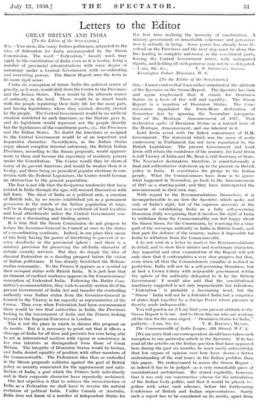Letters to the Editor
GREAT BRITAIN AND INDIA
[To the Editor of the .SPECTATOR.]
Sm,—You seem, like many Indian politicians, attracted to the idea of federation for India recommended by the Simon Commission. The word Federation," loosely used, may apply to the constitution of India even as it is to-day, being a number of provincial administrations with some degree of autonomy under a Central Government with co-ordinating and overriding powers. The Simon Report uses the term in its more rigid sense.
Under its conception of future India the political centre of gravity, as it were, would shift from the Centre to the Provinces and the Indian States. These would be the ultimate source of authority in the land. These would be in direct touch with the people regulating their daily life for the most part, and having legislatures, where they existed, directly elected by the people. The Central Government would be an artificial creation restricted to such functions as the Statute gave it, and its legislature would represent not the people directly but the legislatures of the constituent parts, cit., the Provinces and the Indian States. No doubt the functions so assigned to the Central Government would be of an important and impressive character. Nevertheless, as the Indian States enjoy almost complete internal autonomy, the British Indian Provinces, according to the Simon proposals, would approxi- mate to them and become the repository of residuary powers under the Constitution. The Centre would thus be shorn of many of its present functions and would be weaker than it is to-day, and there being no periodical popular elections in con- nexion with the Federal Legislature, the Centre would become an abstraction to the general population.
The fear is not idle that the fissiparous tendencies that have existed in India througls the ages will reassert themselves with full force. The ideal of India as a political unit, a creation of British rule, by no means established yet as a permanent possession in the minds of the Indian population at large, will be in danger of being lost in a multitude of local loyalties and local attachments unless the Central Government con- tinues as a dominating and binding power.
It is true that the Simon Conunission do not propose to reduce the Governor-General in Council at once to the status of a co-ordinating syndicate. Indeed, in one place they speak of this body having the power of interfering to prevent or re- solve deadlocks in the provincial sphere ; and there is a salutary provision for preserving the all-India character of certain security services. 13ut they do dangle the idea of classical Federation as a dazzling prospect before the vision of Indian politicians. It has already bewitched the Moham- medan community. To the Princes it appears as a symbol Of their co-equal status with British India. It is just here that an element of cardinal weakness appears in the Commissioners' conception of Federated India. Following the Butler Com- mittee's recommendation, they wish to modify section 33 of the present Government of India Act and transfer the controlling authority over Indian states from the Governor-General in Council to the Viceroy in his capacity as representative of the Crown. Thus even when Federation had been consummated there would he two final authorities in India, the Provinces looking to the Government of India and the Princes looking beyond to the Imperial Executive in London.
This is not the place in which to discuss this proposal on its merits. But it is necessary to point out that it effects a cleavage of India for all time and prevents her ever being able to act in international matters with vigour or consistency in her OWR interests as distinguished from those of Great Britain. The integrity of Dominion Status would be broken, and India denied equality of position with other members of the Commonwealth. The Federation idea then as embodied in the Simon proposals militates against the goal of British policy so recently enunciated for the appeasement and satis- faction of India, a goal which the Princes both individually and in their corporate character have repeatedly acclaimed.
One last objection is that to achieve the reconstruction of India as a Federation we shall have to reverse the natural evolution of political India. Unlike Canada or Australia, India does not know of a number of independent States for
tte first time realizing the necessity of combination. A unitary government of remarkable coherence and pervasive- ness is actually in being. Sonic power has already been de- volved on the Pnwinces and the next step must be along this line leading to complete autonomy in the constituent parts, leaving the Central Government intact, with unimpaired dignity, and holding all such power as may not be Si) delegated.




































 Previous page
Previous page